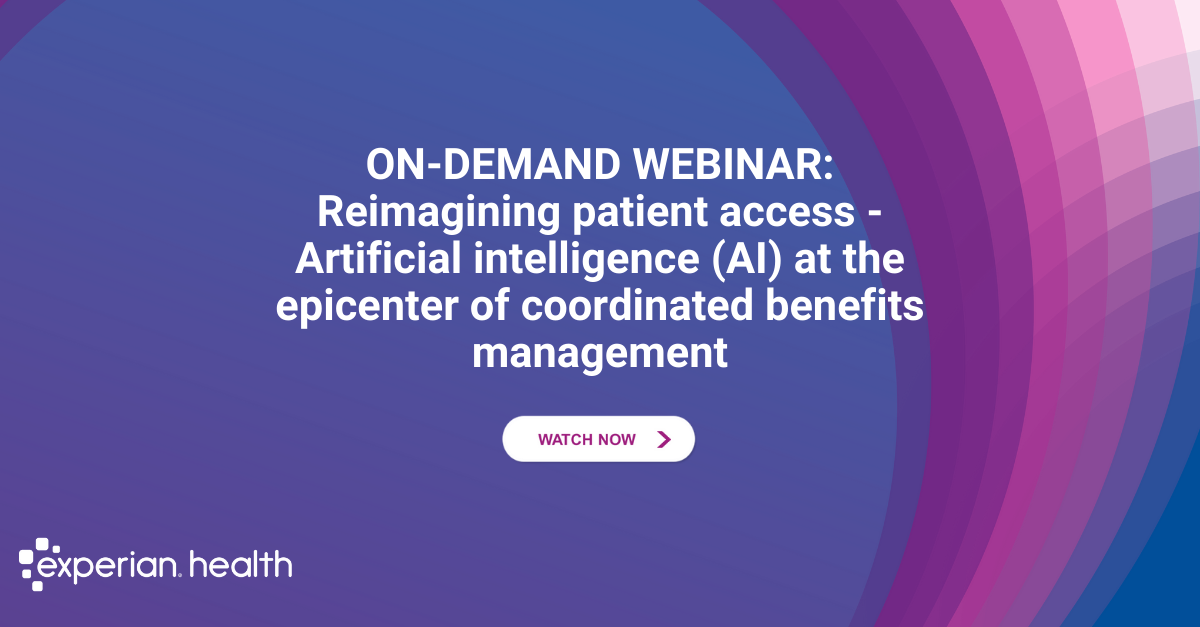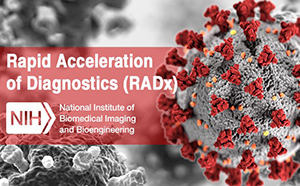health care Claim denials are on the risedespite more than a decade of industry-wide technological advances aimed at improving claims management processes. However, in recent years, the introduction of artificial intelligence (AI) into the healthcare ecosystem has begun to transform the way healthcare organizations manage patient access – and the entire revenue cycle.
This article summarizes a recent webinar with Experian Health Vice President of Innovation David ‘Fig’ Figueredo and Kate Ankumah, Product Manager at Patient Access Curator™, as they look at how healthcare organizations can use AI to build scalable data-driven systems. revenue cycle solutions and deliver measurable value across the patient access ecosystem.

Explore how Experian Health is reshaping the way health systems manage benefits coordination. Discover how automation and AI are eliminating manual errors, reducing denials, and unlocking millions in recoverable revenue.
Evolution of AI in healthcare
For more than a decade, an evolution of technology – mostly based on automation – has attempted to solve the problem of growing denials. Today, with the help of artificial intelligence solutions, the process is moving away from transactional activities towards a more intelligence-based approach.
AI tools can be deployed at every stage of the revenue cycle to solve persistent challenges, such as benefit coordination, eligibility verification, and claims management. And while most providers have the ability to add AI solutions, claim denials continue to rise.
“With all the investment made by organizations like Experian Health and HIS system providers, there is still a high prevalence of issues with benefits coordination and eligibility denials.”
David Figueredo, vice president of innovation at Experian Health
Figueredo further notes that while revenue cycle leaders are aware of AI and its potential, they often remain skeptical of the technology or unsure of how to best leverage AI tools to prevent denial.
Overcome perceptions about AI
Healthcare leaders sometimes struggle with negative perceptions about adopting AI solutions. Figueredo notes that this is common and wants organizations to know that with AI, “there is a lot of power, hope and expectation around using applied technologies and automation in the revenue cycle process.”
Concerns about implementing AI for revenue cycle management vary widely. However, according to the results of an Experian Health data study presented during the webinar, “accuracy and reliability” are often a top concern among healthcare organizations considering adopting AI technology.
Other common concerns about leveraging AI solutions include data privacy and security, cost of implementation, staff resistance and occupational risk, and lack of transparency. Healthcare organizations also want to base the decision to use AI on measurable results. Where in the revenue cycle has AI been implemented? How did you improve denial rates?
Finding a way forward with AI
AI offers healthcare organizations the potential to increase operational efficiency, reduce administrative burdens, and reduce costs. While many revenue cycle leaders are more willing to bet on the use of AI for patient eligibility verification and claims managementThere are still barriers to AI adoption. Figueredo points out:
“We are seeing many organizations that are interested [in AI]but also cautious about its use. Healthcare leaders typically have a specific goal in mind when using AI and want to see results in the real world.” Remind healthcare leaders that with AI “we can do things we couldn’t do before, but that’s how it’s applied to solving things in the world.” [revenue cycle] process” that really matters.
For many healthcare providers, the question is: does adding AI solutions to the revenue cycle provide acceleration? Improve patient access? Reduce the number of manual touches? Can AI do more of the work consistently so that staff work can be reapplied to other areas of focus? Is AI helping to mitigate current staff shortages? Will it reduce costs for healthcare organizations already operating on thin margins?
AI Adoption: RCM Best Practices
When modernizing the revenue cycle, Figueredo reminds healthcare providers to have a clear set of guidelines and recommends ensuring AI solutions are designed to meet specific revenue cycle objectives. Top priorities for healthcare organizations typically include:
- Reduce manual interactions: While there are still some situations that require human intelligence to make decisions, countless simple tasks can be automated to minimize manual workload.
- Fix problems early: Early interventions to proactively correct potential claims issues before they become a larger problem, such as incorrect patient demographics or incorrect eligibility information, can be critical in preventing denials.
- Support real-time integration: To avoid relying on batch audits or ill-informed automated decision-making in the revenue cycle, HIS systems and patient access platforms, such as scheduling and billing, should be designed to handle real-time corrections.
Adopting AI for COB with Experian Health Patient Access Curator
Turnkey AI tools, like Experian’s Health Patient Access Curator (PAC)enable healthcare organizations to implement a Comprehensive COB patient access solution covering every step of the revenue cycle process, starting with patient registration.
PAC consolidates important functions such as eligibility checks, MBI, demographics, and discovery into one seamless solution to maximize clean claims and minimize denials, appeals, and resubmissions. Kate Ankumah, Chief Product Officer at Experian Health Patient Access Curator, explains:
“We know that bad data is like a virus. If it starts bad, it ends in the claim; even if you try to resolve it halfway, it is already saved somewhere. At the time of programming, at the time of registration, [with the Patient Access Curator]we give you the most accurate data so you can live and be accurate in the claim.”
Benefits of leveraging AI for COB and claims management
Adopt COB solutions powered by AI and machine learning, as Experian Health Patient Access CuratorHealthcare providers can improve overall accuracy during claims processing from the beginning and at every step of the revenue cycle. And when errors are reduced from the start, healthcare organizations typically benefit from less wasted staff time, lower denial volumes, expedited denial management, and fewer provider contingency fees, plus a better overall patient experience.
Patient Access Curator is now available – learn how your healthcare organization can get started and avoid claim denials in seconds.



